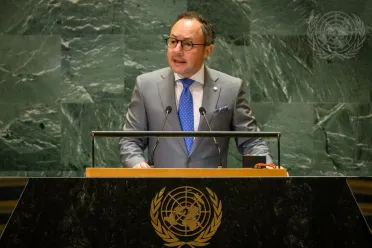Statement
Statement summary
XAVIER ESPOT ZAMORA, Prime Minister of Andorra, underscored that his country, which has never had a war or an army, “is tangible, real proof that people are able to live together peacefully for more than 800 years”. Yet, the spirit of the Declaration of Human Rights is failing little by little, he added, with an advance of extreme political positions. “We find ourselves at a key moment in history” requiring not rhetoric but actions. The UN must respond effectively to the challenges of our times, he added. The implementation of the UN Charter must be ensured, strengthened by the pillars of the defence of human rights and international humanitarian law, which must alone “govern relations between States”. The international community cannot remain indifferent to the serious situations in Ukraine, Gaza, Lebanon, Sudan or the Sahel. It must urgently mobilize to “achieve the most noble goal of politics: peace”.
He called on all parties to work for peace and to respect and obey international humanitarian law. “Nothing can justify the attacks suffered by civilian populations, nothing can justify the attacks against hospitals and schools and nothing can justify using hunger as a strategy of war.” Children are central to this, he said. Therefore, his country has from the beginning given all its support to the Office of the Special Representative of the Secretary-General for Children and Armed Conflict and, more recently, to the study on the impact of climate change on children and armed conflicts. He believes in multilateralism and particularly regional cooperation, including the European Union, and his country is undertaking actions to enter the European Single Market. He highlighted the climate emergency, gender equality, digital transition and cultural diversity as key issues. His country co-facilitated, for yet another year, the resolution on Multilingualism in the UN, with Guatemala.
On climate change, some nations face greater impacts than others, including mountain territories with more vulnerable ecosystems, such as his own. It can change the way of life and the economy. “It's for this reason we have made the fight against climate change one of our main goals internationally as well as nationally.” In 2015, his country was one of the first in the UN Framework Convention on Climate Change to produce its nationally determined contribution. It updated it in 2020 and 2022 and plans to achieve climate neutrality in 2050. Nationally, it has implemented a new energy policy to progressively increase production of renewable energy and replace heat production systems with less-polluting systems. The public sector led this policy, with very ambitious legislation and significant aid and action plans. But, he said, “all of these efforts will be in vain if other countries do not do the same thing”.
He called for the achievement of the Sustainable Development Goals (SDGs), particularly including women. Boys and girls must be given the tools to question societal norms. “But bringing about gender equality requires determination and prevenance on the part of each and every one of us.” As national representatives, “we have the moral and political obligation to promote this transformation”. The digital divide must also be closed. Currently, 96 per cent of Andorran homes have an Internet connection. The country has implemented a national strategy for digital transition, which is particularly focused on digital rights of citizens and respect for Sustainable Development Goals 9, 16 and 17. It has created an ethical and legal framework to preserve digital rights, protect private life and data security and ensure free access to digital information. “We want all citizens to be able to access the digital world and thus avoid situations of inequality.”

